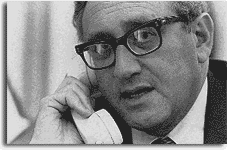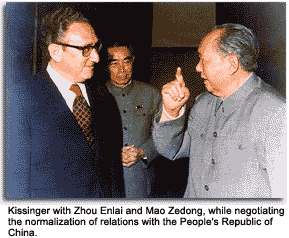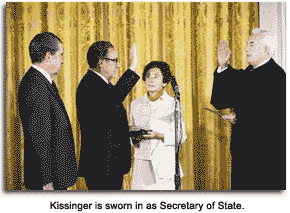Henry Kissinger, also known as "Henry the K" and "Dr. K," was arguably one of the single most visible, powerful, and controversial figure in world politics the U.S. has ever fielded.
He is credited with developing the policy of Detente, beginning talks to reduce strategic arms (SALT), encouraging China to expand international trade and foreign relations, and ending the Vietnam War.
 Conversely, he is accused of such enormities as advising South Vietnam to pull out of the Paris Peace Talks in 1968, thus prolonging the Vietnam War; directing the first phase of the secret bombing of Cambodia, resulting in 200,000 deaths from 1969 to 1975; engineering the covert overthrow and assassination of Chilean socialist president Salvador Allende in 1973, and supporting U.S. arms sales to Indonesia at a time when that nation was attempting to annex East Timor in 1975, leading to the slaughter of 200,000 East Timorese, among other atrocities.
Conversely, he is accused of such enormities as advising South Vietnam to pull out of the Paris Peace Talks in 1968, thus prolonging the Vietnam War; directing the first phase of the secret bombing of Cambodia, resulting in 200,000 deaths from 1969 to 1975; engineering the covert overthrow and assassination of Chilean socialist president Salvador Allende in 1973, and supporting U.S. arms sales to Indonesia at a time when that nation was attempting to annex East Timor in 1975, leading to the slaughter of 200,000 East Timorese, among other atrocities.
Regardless of one's opinion, Henry Kissinger was a larger-than-life player on the world's largest stage.
The early years
Henry (nee Heinz) Alfred Kissinger was born in May 1923, in Bavaria. As a mid-teenage Jewish youth, he accompanied his family to New York City when they escaped Adolph Hitler's persecution in 1938. He was naturalized as a U.S. citizen in 1943.
Kissinger's early American experience included working in a shaving brush factory while attending high school. He was drafted into the army in 1943 and served as an interpreter of German.
Following the war, Kissinger earned his B.A. summa cum laude in 1950 from Harvard College and his M.A. and Ph.D. in 1952 and 1954, respectively, from Harvard University. His doctoral dissertation A World Restored: Metternich, Castlereagh and the Problems of Peace 1812-22 predicted his point of view in the White House.
Kissinger the statesman
Kissinger became involved in political activism and came to be convinced that he could make a difference in the way government was conducted. Consequently, he backed New York governor Nelson Rockefeller, who ran unsuccessfully for the Republican presidential nomination in 1960, 1964, and 1968.
Kissenger's political philosophy was highly influenced by "realpolitik" (German for "politics of reality"), which is "foreign politics based on practical concerns rather than theory or ethics."
An early example of realpolitik and utilitarianism was Machiavelli's Il Principe or The Prince (circa A.D. 1515), written to encourage the appearance of a political savior who would unify corrupt Italian city states of the time and fend off foreign conquest — and advocated the notion that "whatever was expedient was necessary."
 After being invited by President Richard M. Nixon to be his national security advisor in 1969, Kissinger formally introduced realpolitik in the White House. In that context, Kissinger intended for the policy to deal with other powerful nations in a practical manner, rather than on the basis of political doctrine or ethics — for instance, Nixon's diplomacy with the People's Republic of China, despite the United States' manifest opposition to communism and the doctrine of containment.
After being invited by President Richard M. Nixon to be his national security advisor in 1969, Kissinger formally introduced realpolitik in the White House. In that context, Kissinger intended for the policy to deal with other powerful nations in a practical manner, rather than on the basis of political doctrine or ethics — for instance, Nixon's diplomacy with the People's Republic of China, despite the United States' manifest opposition to communism and the doctrine of containment.
The term "shuttle diplomacy" came into vogue in 1973 to describe a busy year for Kissinger. He was sworn in as Secretary of State, and awarded the Nobel Peace Prize (along with Vietnam's Le Duc Tho¹), for bringing about the Paris Peace Accords. He also helped to normalize relations with China by making two secret trips for the White House, and bring an end to the Yom Kippur War in the Middle East. It also was in 1973 that Kissinger and the CIA allegedly influenced the overthrow of a democratically elected Chilean government by U.S.-backed General Augusto Pinochet and members of the Chilean military.
Post-White House years
When Democratic Jimmy Carter won the 1976 presidential election over Gerald R. Ford, Kissinger turned to political consulting, writing, and speaking, as well as serving on such policymaking groups as the Trilateral Commission.
As the Republican Party began its swing further to the right in 1981, Kissinger's role in the conservative Ronald Reagan and George H.W. Bush terms of office was limited. Even though Kissinger was a Republican, leaders of the party took Kissinger's stance on detente as a sign of weakness.
Following the September 11, 2001, attack on the World Trade Center and the Pentagon, Kissinger was selected to chair the investigative committee that would track the events leading up to that fateful day. That appointment drew heavy criticism upon President George W. Bush because of Kissinger's alleged involvement in the aforementioned, alleged war crimes and his record of shunting aside the public's right to be informed about governmental activities (see Freedom of Information Act).
Pandora's Box?
Kissinger began to be hounded for alleged scheming in the geopolitical arena.
In May 2001, a French judge served Kissinger a summons to answer questions about the death of French citizens during the Pinochet regime, as well as his knowledge about "Operation Condor."² Kissinger refused. He chose to return to the U.S. that night, rather than respond to foriegn inquiries.
In July of that year, Chile's highest court gave permission to an investigative judge to question Kissinger about the execution of American journalist Charles Horman by Pinochet loyalists in 1973. Although the questions were relayed via diplimatic channels, Kissinger again chose not to answer, leading to a request for his extradition by the Chilean government.
In August, 2001 the Argentine government requested a deposition from Kissinger regarding Operation Condor.
In September, the family of slain Chilean general Rene Schneider filed a civil suit in a U.S. federal court, asserting that Kissinger decided to execute Schneider because he opposed the ultimately failed 1970 coup against newly elected president Allende. The following day, Chilean human rights lawyers implicated Kissinger, along with Pinochet, Alfredo Stroessner (former dictator of Paraguay), and a number of U.S., Chilean, and Argentinian officials, in a criminal lawsuit claiming the defendants were complicit in "crimes against humanity, war crimes, violations of international treaties, conspiracy to commit murder, kidnapping, and torture" in their role in Operation Condor.
 Late in 2001, Brazilian authorities were forced to cancel a speaking engagement for Kissinger because the government could not guarantee his protection from legal proceedings.
Late in 2001, Brazilian authorities were forced to cancel a speaking engagement for Kissinger because the government could not guarantee his protection from legal proceedings.
In 2002, the United Kingdom denied a request from a Spanish judge, backed by French officials, to request that Interpol detain Kissinger for questioning about events in Chile. In addition, a petition was filed in London for his arrest, citing "the destruction of civilian populations and environment in Indonesia from 1969 to 1975."
East Timorese activists have accused Kissinger of "aiding and abetting genocide" by backing the bloody Indonesian invasion and occupation of their island, a former Portuguese protectorate.
Those accusations, according to Kissinger, are all rebuttable. Examples: "Each instance is taken out of context." The bombing of Cambodia was against North Vietnamese regulars and the Vietcong; the Indonesian affair was allowed because it was "consistent with the Cold War containment policy of the times."
Kissinger remains a polarizing figure in U.S. politics, both condemned as an alleged war criminal by human rights activists and regarded as a highly effective U.S. Secretary of State by some international relations scholars. Kissinger is the last surviving member of Nixon's Cabinet and currently the oldest living former U.S. Cabinet member.
The U.S. was implicated by serving as the intelligence coordinator with headquarters in the Panama Canal Zone.
A document was discovered among some 16,000 records released in 2001 by the White House, Defense and Justice departments, as well as other government entities. The document and related material has been nicknamed the “Archive of Terror,” and was initiated by the secret police of Chile’s Pinochet.
The document, a cable sent to then Secretary of State Cyrus Vance, stating a concern that “the U.S. connection to Condor might be revealed during the then ongoing investigation into the deaths of former Chilean foreign minister Orlando Letelier and his American colleague, Ronni Moffitt, who were killed by a car bomb in Washington, D.C. ‘It would seem advisable,’ he suggests, ‘to review this arrangement to insure that its continuation is in U.S. interest.’”
"'This document opens a pandora's box of questions on the U.S. knowledge of, and role in, Operation Condor,’ said Senior Analyst Peter Kornbluh, director of the National Security Archive's Chile Documentation Project.” The National Security Archive then called on the U.S. intelligence community — NSA, CIA, DIA, and other Defense Department bureaus at the U.S. Southern Command — to make public their files on communications assistance to the military regimes in the southern cone.